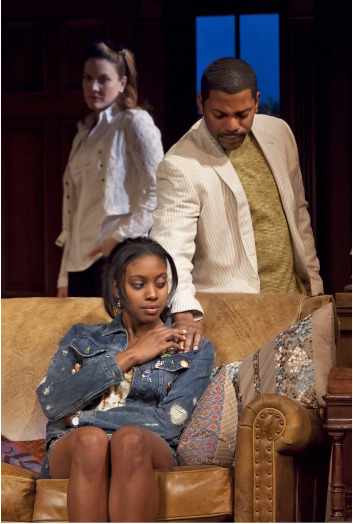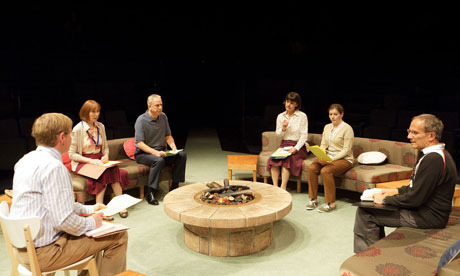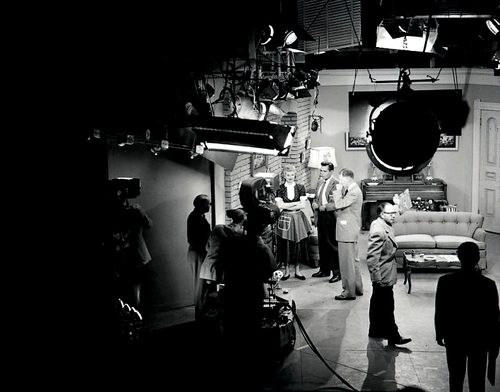Terry Teachout's Blog, page 194
December 11, 2011
TT: Just because
(This is the latest in a series of arts-related videos that appear in this space each Monday and Wednesday.)
December 9, 2011
TT: Guess who's coming to Martha's Vineyard
* * *
 One of the most exciting things that a playwright can do is to show you an unfamiliar way of life. A play that succeeds in doing so can be forgiven any number of theatrical sins. "Stick Fly," in which Lydia R. Diamond puts America's black upper class onstage, fills the bill on all counts. Yes, it's a mess, but a fascinating one, well directed by Kenny Leon and performed with total persuasiveness by his ensemble cast, and the best parts are so good that you'll be glad to forgive Ms. Diamond when she goes wrong.
One of the most exciting things that a playwright can do is to show you an unfamiliar way of life. A play that succeeds in doing so can be forgiven any number of theatrical sins. "Stick Fly," in which Lydia R. Diamond puts America's black upper class onstage, fills the bill on all counts. Yes, it's a mess, but a fascinating one, well directed by Kenny Leon and performed with total persuasiveness by his ensemble cast, and the best parts are so good that you'll be glad to forgive Ms. Diamond when she goes wrong.The setting is the posh Martha's Vineyard summer home of the LeVays. Save for the fact that they're black, the LeVays seem like just the sort of people whom you'd expect to have a posh Martha's Vineyard summer home. Joe (Ruben Santiago-Hudson) is a neurosurgeon whose two sons, Flip (Mekhi Phifer) and Spoon (Dulé Hill), are pursuing similarly class-specific careers (Flip is a plastic surgeon, Spoon a first-time novelist who's still trying to "find himself"). They have a maid (Condola Rashad), collect art, play Parcheesi and drink a lot. As the play opens, both young men bring their girlfriends (Rosie Benton and Tracie Thoms) home for the first time. Neither one is quite what Joe expected. Taylor (Tracie Thoms), Spoon's girl, is an earnest graduate student who is ill at ease among the rich, while Kimber (Rosie Benton), Flip's well-heeled companion, is--big surprise--white....
As this description suggests, "Stick Fly" feels like two related plays that have been woven loosely together. In the "Guess Who's Coming to Dinner" part, Ms. Diamond's wholly original subject matter is at war with her been-there-done-that plot. Once she finally gets around to springing Joe's surprise (which isn't all that surprising--you'll see it coming midway through the first act) on the audience, the dramatic stakes go up, and "Stick Fly" shakes off its play-safe trappings and starts taking chances....
 Alan Ayckbourn's politically flavored plays tend not to get done in America. All credit, then, to 59E59 Theatres' annual Brits Off Broadway festival for showing us a different side of Mr. Ayckbourn with his own crisp, tidy staging of "Neighbourhood Watch," a darkish comedy about the coming of fascism to a middle-class suburb.
Alan Ayckbourn's politically flavored plays tend not to get done in America. All credit, then, to 59E59 Theatres' annual Brits Off Broadway festival for showing us a different side of Mr. Ayckbourn with his own crisp, tidy staging of "Neighbourhood Watch," a darkish comedy about the coming of fascism to a middle-class suburb. The characters in "Neighbourhood Watch," terrified by urban unrest and dismayed by the seeming unwillingness of the police to do anything about it, vote to take matters into their own hands and turn their once-cozy neighborhood into a gated community. As is Mr. Ayckbourn's wont, things get out of hand, and before you know it, the Bluebell Hill Development has become a prison camp...
"Neighbourhood Watch" falls short of Mr. Ayckbourn's usual high standards in two ways. Not only do its disparate parts fit somewhat awkwardly together, but it's more than a little bit trite for him to suggest that the authoritarian impulses of Martin and Hilda (Matthew Cottle and Alexandra Mathie), the ever-so-genteel Hitler and Eva Braun of Bluebell Hill, arise from their sexual inhibitions. Even so, "Neighbourhood Watch" is both funny and (mostly) smart...
* * *
Read the whole thing here .
TT: The small screen, sixty years ago
* * *
In present-tense culture, golden anniversaries tend to get swept away by the whirlwind of current events. Here's an example: Network television as we know it came into being on Sept. 4, 1951, when AT&T threw the switch on the first transcontinental coaxial cable. Up to that time, TV had been an essentially regional phenomenon. The most important network shows were all performed live in New York, and the only way for West Coast viewers to see them was for fuzzy-looking film copies called "kinescopes" to be shipped to Los Angeles and broadcast a week later. The coaxial cable changed that by making it possible to transmit live video signals from coast to coast--in both directions. Within a matter of months, Hollywood had become a major center of TV production.
Don't be embarrassed if you didn't know any of this. So far as I know, no one has taken note of the golden anniversary of the coaxial cable, or celebrated the fiftieth birthdays of three influential series that the cable made possible. But if you owned a TV set in 1951, you might well remember these Truman-era debuts:
 • Oct. 15, 1951: "I Love Lucy," the first Hollywood-based sitcom to be shot on film with three cameras in front of a live studio audience. Lucille Ball's zany antics soon made it the most popular show on the air. At a time when there were only 15 million TV sets in America, 11 million families watched "I Love Lucy" every Monday night.
• Oct. 15, 1951: "I Love Lucy," the first Hollywood-based sitcom to be shot on film with three cameras in front of a live studio audience. Lucille Ball's zany antics soon made it the most popular show on the air. At a time when there were only 15 million TV sets in America, 11 million families watched "I Love Lucy" every Monday night.• Nov. 18, 1951: "See It Now," the first TV newsmagazine, whose first episode opened with a shot of two control-room monitors. One showed a live picture of the Statue of Liberty, the other a live picture of the Golden Gate Bridge. Edward R. Murrow, the host, was visibly impressed: "For the first time, man has been able to sit at home and look at two oceans at the same time." It may sound quaint now, but 60 years ago that image took people's breaths away.
• Dec. 16, 1951: "Dragnet," the first filmed crime drama to make extensive use of location shooting. When Jack Webb opened each episode by saying "This is the city," he meant Los Angeles, not a cramped TV studio somewhere in midtown Manhattan--and that's what you saw on the small screen.
Sound familiar? It should--just as it did in 1951. Not only did "See It Now," "I Love Lucy" and "Dragnet" originate on radio, but they're still being imitated....
* * *
Read the whole thing here .
The opening sequence of the first episode of See It Now:
"The Human Bomb," the first episode of Dragnet, directed by Jack Webb, written by James E. Moser, and starring Webb, Barton Yarborough, and Raymond Burr:
TT: Almanac
Albert Schweitzer, The Spiritual Life
December 8, 2011
TT: The end of the line
* * *
Anton Chekhov's plays, sublime though they are, have a well-deserved reputation for being hard directorial nuts to crack. This may explain why "The Cherry Orchard" doesn't get done nearly as often as it should in this country. Take Classic Stage Company's ambitious "Chekhov Initiative" cycle, which has been, perhaps inevitably, a hit-or-miss affair in which a very fine "Seagull" directed by Viacheslav Dolgachev in 2008 was followed by Austin Pendleton's interesting but exceedingly uneven "Uncle Vanya" and "Three Sisters." This time around, though, CSC has covered itself in glory, giving "The Cherry Orchard" a staging directed by Andrei Belgrader and led by John Turturro, Juliet Rylance and Dianne Wiest that is as good as anything you're likely to see on a New York stage this season--or anywhere else, at any other time.
 What makes Mr. Belgrader's "Cherry Orchard" so noteworthy? To begin with, he's struck the right balance between comedy and melancholy, which is the key to making Chekhov's masterpiece work onstage. If it's not funny, it becomes lugubrious; if it's too broad, like the slapsticky version that Boston's Huntington Theatre Company mounted four years ago, the results can swing perilously near vulgarity. Mr. Belgrader nails it, giving full value to the farcical side of the Gaevs, Chekhov's impoverished family of aristocratic landowners, without ever letting you forget that theirs is the plight of a once-dignified class that has reached the end of its rope.
What makes Mr. Belgrader's "Cherry Orchard" so noteworthy? To begin with, he's struck the right balance between comedy and melancholy, which is the key to making Chekhov's masterpiece work onstage. If it's not funny, it becomes lugubrious; if it's too broad, like the slapsticky version that Boston's Huntington Theatre Company mounted four years ago, the results can swing perilously near vulgarity. Mr. Belgrader nails it, giving full value to the farcical side of the Gaevs, Chekhov's impoverished family of aristocratic landowners, without ever letting you forget that theirs is the plight of a once-dignified class that has reached the end of its rope.While everyone in the stellar cast is on Mr. Belgrader's wavelength, it is Mr. Turturro whose performance is most essential to the effect of the production. He plays Lopakhin, the up-and-coming merchant who buys the estate on which his ancestors worked as slaves, with a bitter touch of Shylock-like vengefulness--yet he is no less alive to Lopakhin's ludicrous, even pathetic side....
Speaking of tough nuts, the Brooklyn Academy of Music's Next Wave Festival has imported Dublin's Gate Theatre revival of "Krapp's Last Tape," Samuel Beckett's hour-long 1958 "duologue" for an angry old writer (John Hurt, made up to look like Beckett himself) who listens to a tape recording of himself when young and can't stand what he hears. Indeed, he doesn't seem to like much of anything except bananas, a fruit for which he has a weakness bordering on compulsion.
"Krapp" is, like all of Beckett's plays, a black comedy of the utmost horror and despair, and Mr. Hurt, who famously played the title role in Atom Egoyan's 2000 TV version, is once again in perfect harmony with Krapp's agony....
* * *
Read the whole thing here .
John Hurt in the 2000 TV version of Krapp's Last Tape:
TT: So you want to see a show?
Here's my list of recommended Broadway, off-Broadway, and out-of-town shows, updated weekly. In all cases, I gave these shows favorable reviews (if sometimes qualifiedly so) in The Wall Street Journal when they opened. For more information, click on the title.
BROADWAY:
• Anything Goes (musical, G/PG-13, mildly adult subject matter that will be unintelligible to children, closes Apr. 29, most performances sold out last week, reviewed here)
• Chinglish (comedy, PG-13, adult subject matter, closes Apr. 29, reviewed here)
• Follies (musical, PG-13, adult subject matter, closes Jan. 22, reviewed here)
• Godspell (musical, G, suitable for children, reviewed here)
• How to Succeed in Business Without Really Trying (musical, G/PG-13, perfectly fine for children whose parents aren't actively prudish, reviewed here)
• Other Desert Cities (drama, PG-13, adult subject matter, most performances sold out last week, reviewed here)
• Seminar (serious comedy, PG-13, closes Mar. 4, most performances sold out last week, reviewed here)
OFF BROADWAY:
• Dancing at Lughnasa (drama, G/PG-13, closes Jan. 15, reviewed here)
• Avenue Q (musical, R, adult subject matter and one show-stopping scene of puppet-on-puppet sex, reviewed here)
• The Fantasticks (musical, G, suitable for children capable of enjoying a love story, reviewed here)
• Million Dollar Quartet (jukebox musical, G, off-Broadway remounting of Broadway production, original run reviewed here)
CLOSING SOON ON BROADWAY:
• Venus in Fur (serious comedy, R, adult subject matter, closes Dec. 18, most performances sold out last week, reviewed here)
TT: Almanac
Bertrand Russell, The ABC of Relativity
December 7, 2011
TT: Snapshot
(This is the latest in a series of arts-related videos that appear in this space each Monday and Wednesday.)
TT: Almanac
Carl Sagan, Cosmos
December 6, 2011
TT: Almanac
Francis Wyndham, "Ursula"
Terry Teachout's Blog
- Terry Teachout's profile
- 45 followers



